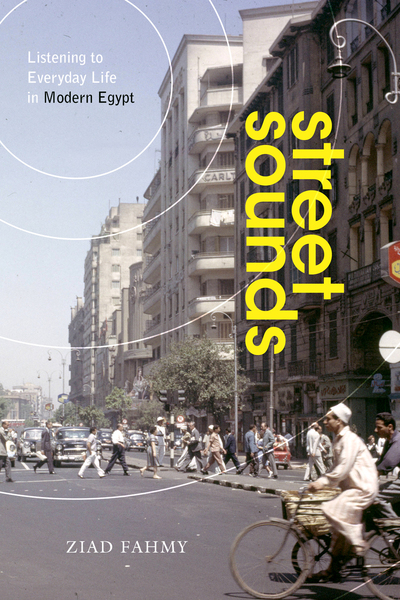The Politics of Street Sounds in Interwar Egypt
hosted by Chris Gratien
| During the interwar period, the recording industry reshaped Egyptian culture and politics through music. But as we discuss in part two of our four-part series on "The Sound of Revolution in Modern Egypt," everyday sounds of the city are no less part of Egypt's political history. As our guest Ziad Fahmy explains, writing sonic history requires listening to the sources with ears attuned to the sentiments and sensibilities of past people. Together, we listen to a early recording of Egyptian street sounds and explore the world of sound that awaits within the textual record, focusing on how class dynamics played out on the soundscape of Cairo and Alexandria. We also consider how the rise of a new medium, radio, began to reshape the sonic life of ordinary Egyptians during the interwar period, paving the way for the media revolution of the 1950s and 60s.
 | Click for RSS Feed | 
|

|
During the interwar period, the recording industry reshaped Egyptian culture and politics through music. But as we discuss in part two of our four-part series on "The Sound of Revolution in Modern Egypt," everyday sounds of the city are no less part of Egypt's political history. As our guest Ziad Fahmy explains, writing sonic history requires listening to the sources with ears attuned to the sentiments and sensibilities of past people. Together, we listen to a early recording of Egyptian street sounds and explore the world of sound that awaits within the textual record, focusing on how class dynamics played out on the soundscape of Cairo and Alexandria. We also consider how the rise of a new medium, radio, began to reshape the sonic life of ordinary Egyptians during the interwar period, paving the way for the media revolution of the 1950s and 60s.
Contributor Bios
 |
Ziad Fahmy is a Professor of Modern Middle East History at Cornell University’s department of Near Eastern Studies. Professor Fahmy is the author of Street Sounds: Listening to Everyday Life in Modern Egypt (Stanford University Press, 2020). Street Sounds was a co-winner of the Urban History Association's 2021 Award for Best Book in Non-North American Urban History. He also wrote Ordinary Egyptians: Creating the Modern Nation through Popular Culture (Stanford University Press, 2011), and is currently writing his third book, tentatively titled, Broadcasting Identity: Radio and the Making of Modern Egypt, 1925-1952. |
 |
Chris Gratien is Associate Professor of History at University of Virginia, where he teaches classes on global environmental history and the Middle East. His first book, The Unsettled Plain: An Environmental History of the Late Ottoman Frontier, explores the social and environmental transformation of the Adana region of Southern Turkey during the 19th and 20th century. |
Credits
Episode No. 557
Release Date: 4 December 2023
Sound production by Chris Gratien
Sound Elements: Travel Penguin - Islamic Cairo, Al-Muizz Street - Egypt; Chris Gratien - Nightime Cab in Cairo (2005); Munira al-Mahdiyya - Aldahre Kata Awsali; Fox Movietone - Egyptian Army review; Egyptian Dancers; Cairo Street Scenes, 1928 (University of South Carolina Libraries); Ya Shabab El Nil - Umm Kulthum; جزء من مباراة بين الزمالك وانترناسونالي الإيطالي تعليق محمد لطيف
Release Date: 4 December 2023
Sound production by Chris Gratien
Sound Elements: Travel Penguin - Islamic Cairo, Al-Muizz Street - Egypt; Chris Gratien - Nightime Cab in Cairo (2005); Munira al-Mahdiyya - Aldahre Kata Awsali; Fox Movietone - Egyptian Army review; Egyptian Dancers; Cairo Street Scenes, 1928 (University of South Carolina Libraries); Ya Shabab El Nil - Umm Kulthum; جزء من مباراة بين الزمالك وانترناسونالي الإيطالي تعليق محمد لطيف
Further Listening
 |
Hanan Hammad | 350
3/5/18
|
Industrial Sexualities in Twentieth-Century Egypt |
 |
Christopher Silver | 498
3/22/21
|
The Maghreb in the Gramophone Era |
 |
Lauren Davis | 363
6/22/18
|
Istanbul and the Ottoman Olfactory Heritage |
 |
James Ryan | 096
3/16/13
|
Transportation and Public Space in Ottoman Istanbul |
 |
Chloe Bordewich | 543
5/6/23
|
News, Leaks, and Propaganda in Modern Egypt |
Images

Bikes and carts share a narrow Cairo side street, 1934. Source: American Colony via Library of Congress

Automobiles and trolleys sharing a wide Cairo thoroughfare, 1934. Source: American Colony via Library of Congress
This 1928 film by the Fox Movietone Company is one of the earliest audiovisual sources for the history of modern Cairo. Watch the clip to see the images that accompanied the sounds featured in the podcast.
Further Reading

Barak, On. 2013. On Time : Technology and Temporality in Modern Egypt. Berkeley: University of California Press.
Chalcraft, John T. 2004. The Striking Cabbies of Cairo and Other Stories : Crafts and Guilds in Egypt 1863-1914. Albany N.Y: State University of New York Press.
Fahmy, Ziad. 2020. Street Sounds : Listening to Everyday Life in Modern Egypt. Stanford: Stanford University Press.
Jacob, Wilson Chacko. 2011. Working Out Egypt : Effendi Masculinity and Subject Formation in Colonial Modernity 1870-1940. Durham NC: Duke University Press.
Zdafee Keren. 2020. Cartooning for a Modern Egypt. Leiden: Brill.











Comments
Post a Comment
Due to an overwhelming amount of spam, we no longer read comments submitted to the blog.